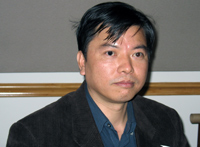




WASHINGTON—A former student leader of China's 1989 pro-democracy protests has expressed deep remorse for the actions of the students in handing over to authorities three men from Hunan who defaced the portrait of Chairman Mao at Tiananmen Square.
“In regard to the three people including Lu Decheng defacing the Mao Zedong portrait, in the beginning, I feel that it was a righteous act, at least from the present viewpoint,” U.S.-based dissident Wang Dan told RFA’s Mandarin service following Lu Decheng’s in-depth interview by Jill Ku.
We have a very deep remorse toward him and other people like Yu Dongyue.
“Due to the actions of individual students, Lu Decheng and the other two people have paid a huge price. As part of the student body in 1989, just like those who took part in the alliance such as Wu’er Kaixi and Wang Chaohua, we have a very deep remorse toward him and other people like Yu Dongyue,” Wang said.
“Now that Lu Decheng has arrived in the free world, we also hope to offer him as much help as possible so that he can settle down in the free world,” he said.
Lu, a former bus driver from the southern province of Hunan, told Ku’s “Different Voices” program that the protest, carried out with schoolteacher Yu Zhijian and arts editor Yu Dongyue, was probably 20 years in advance of what most Chinese people found acceptable in 1989.
The three men traveled to Beijing in May 1989 to join the thousands of student-led protesters who were encamped on the square. On May 23, the three men threw eggs filled with red, blue, and yellow paint at the large portrait of Mao over the Tiananmen gate, an icon of Communist China.
Lu escaped China illegally, spending several months in a Bangkok jail before finally arriving in Canada, but without his wife and child. Yu Dongyue was freed on Feb. 22 but has been tortured to the point of mental collapse. Lu Decheng was freed in 1999 after 10 years in jail, while Yu Zhijian was freed in 2000 after serving 11 years.
Lu said attitudes among exiled pro-democracy activists who either escaped overseas or were released, such as Wang in 1998 under international pressure, had changed in the 17 years since the Tiananmen Square protests, which ended in a bloody military crackdown in which hundreds of people died.
“An increasing number of Chinese, I mean overseas Chinese, are more aware of the autocratic, totalitarian, and violent nature of the Chinese Communist Party,” Lu said. “This is huge progress. All the unrealistic illusions 17 years ago were born out of illusions about China, always hoping that there would be so-called ‘reform.’”
Wang said he wasn’t aware of the decision at the time, and only later learned that Lu and the others had been given up to the authorities.
“The situation on the Square was very chaotic. Frankly, I personally have not looked deeply into this incident. With the passing of time, as the price that Lu Decheng and the other two have paid seems to get higher and higher, I believe the remorse in people’s hearts is naturally becoming deeper and deeper,” Wang said.
“I learned about it two or three days later because it was in the newspaper,” he said.
Lu said he was comforted by the change in attitudes toward their actions back in 1989. “Actually, specifically speaking, since we were in extraordinary times, certain parts of their actions were understandable,” he said, calling on the rest of the world not to “appease” China and not to forget the plight of Yu Dongyue.
“If they continue to use the existing appeasement mentality to associate with the Chinese Communist Party, it is like drinking poison to quench thirst and it could very possibly lead to dreadful consequences,” said Lu, who was frequently tearful during the interview.
“Its sole purpose is to uphold its existing totalitarian rule and the one-party dictatorship. This is its core. Therefore, we must not have any illusions,” he said.
Lu described his clandestine trip through Burma and into Thailand as dangerous, but with the help of a well-organized relay system of “friends” helping him through. At times, in the jungle, with only a compass to guide them, he and his companions listened frequently to RFA’s Mandarin service programs.
“It’s true,” he said, with evident emotion. “I am not exaggerating. I relied on the only radio that I carried to listen to the programs of Radio Free Asia every day to sustain my determination to continue.”
Original reporting in Mandarin by Jill Ku. RFA Mandarin service director: Jennifer Chou. Written for the Web in English by Luisetta Mudie. Edited by Sarah Jackson-Han.